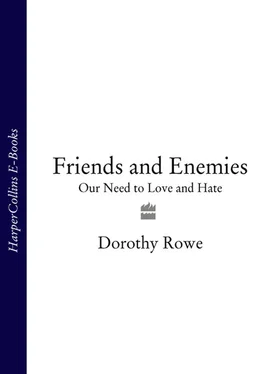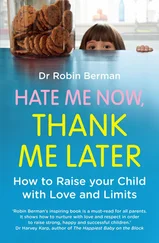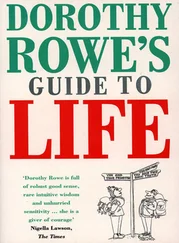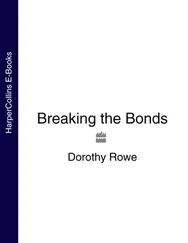Yet, as I discovered when he took me to Drumcree, where the Orange Order supporters manned the country lane, protesting their right to march down the Garvaghy Road through the Catholic estate in Portadown, Anthony, in his kindness, had taken me somewhere where, if it were known that he was a Catholic, he would have been in considerable physical danger.
Those of us who live in peaceful countries can still have enemies – friends who betray you. Judy told me about her enemies – a business partner who had stolen from her and some friends who had formed a clique and excluded her, and what she had done to them. She said, ‘My way of dealing with people who’ve been rotten to me is to pretend they’re dead. I feel angry for a long time and then I get to a stage where, when their names come up, I can say, “Who?” It takes about two years. We forget about them, people who’ve done really rotten things to us. Then they’re dead. They’ve gone over to the dark side.’
Sometimes Judy’s revenge was even greater. She said, ‘I have my own revenge. I put curses on them. I beam my energy out.’
I think Judy was so kind she did not beam her energy very far. None of the politicians she hated have dropped dead. But there is a certain satisfaction in hurling a curse, even if it is only at a television screen.
Enemies can certainly play an important part in our life but I had not thought of them as being useful until I met a Serbian Jungian analyst in Belgrade. I asked him whether he had any enemies. ‘Internal or external?’ he queried.
‘Both.’
‘I don’t think I can talk about my internal enemies where I am an enemy to myself. That’s where external enemies are necessary. They see you more clearly than you see yourself. They stop you from having too high an opinion of yourself.’
I would have called such a group of people ‘critics’ rather than ‘enemies’ but I did not think this was simply a confusion of terms. He spoke excellent English, so if he said ‘enemy” he meant ‘enemy”. But only a Jungian analyst would have beneficent enemies.
I asked him if he had any political enemies. ‘Of course,’ he said. ‘Americans.’
I wonder if many Americans realize how big a part they play on the world stage as the universal enemy. But that is one of the dilemmas of friendship. The more powerful you are the fewer friends you are likely to have.
I am sure that many Americans would be greatly hurt to know that millions of people beam great amounts of enmity at them and take no account of how many Americans – though not always the American government – have tried to help impoverished people and, however ineptly, to secure world peace. Fortunately, not all foreigners do this. When I was in Vietnam in 1997 I discovered that the Vietnamese discriminated carefully between the American government that inflicted the most dreadful war on the Vietnamese and the Cambodians, and Americans generally, whom the Vietnamese saw as friends or potential friends. Such subtle discriminations require a subtle mind, which is lacking in those people who want to divide the world into two groups, friends and enemies.
Yet friends and enemies are rarely discrete categories. Friends can easily become enemies. In Northern Ireland I met Martin at a Sinn Fein Advice Centre in Fermanagh. He had recently been released from Long Kesh jail, where he had been serving an eight-year term. We got on to the subject of education and he told me how, in many places in Northern Ireland, Catholic and Protestant children would attend the same primary school. His best friend at primary school was William, a lad from a Protestant family. He said, ‘We played football together, we went fishing together, we did everything boys do together. In our last year in primary school, when I was eleven, I was one of six boys who passed the eleven-plus exam to go to the Christian Brothers School. William went to the local Protestant high school. The next time I saw him it was on a street in Castlederg. He was in an Ulster Defence Regiment uniform. He stopped me and made me get out of my car. He knew who I was but he didn’t let on that he knew. He asked me my name, then he searched me and he searched my car.’ Not long afterwards Martin became a volunteer in the IRA.
Sometimes friends become enemies because the groups to which individuals belong demand that it be so. Sometimes individuals themselves decide to change from friend to enemy. Sometimes it is hard to know who is your friend and who your enemy. Mark Twain once observed that ‘It takes your enemy and your friend, working together, to hurt you to the heart: the one to slander you and the other to get the news to you.’ 5
Irene spoke of the spite which can lurk in the heart of a friend. She said, ‘Spite is one of the things I dislike, probably because I have a spiteful reaction inside myself sometimes and I find it horrible. There’s that desire to hurt. I think envy’s different. You can envy someone for having a terrific relationship you’d like to have, or having freedom from financial worries. I think that’s fine because it doesn’t mean you want to do them down or make them feel unhappy. Whereas spite has a real sting. To take them down, make them feel unhappy with themselves and what they’ve got.’
When we act out of spite and enmity we want to hurt other people and know that they are hurt, yet at the same time we do not want to know how the hurt feels to them. We have to refrain from empathizing with them. Empathy can bring us close to other people, but it can cause us much pain and that sense of helplessness when we know what another person is feeling and we can do nothing to ease that person’s pain. A mother told me how upset she was by the way her teenage son’s friends were also his enemies. They hurt him and they got him into trouble, but he still trailed after them, entranced by what he saw as their style and glamour, and proud to call them his friends. Friends can indeed be enemies.
When I asked my workshop participants to list what they saw as the dangers of friendship they had no difficulty in doing so. Here are some of the dangers they described:
• ‘The fear of the loss of the friend through death or separation.’ (Someone pointed out that people will commiserate with you when a relative dies but not when a friend dies.)
• ‘It means trusting someone with very sensitive parts of myself, so I am vulnerable and can be hurt. If I become dependent on that friendship that person might let me down.’
• ‘They can tell you things when they’re in difficulty and you want to make it all right and you can’t.’
• ‘Being taken for granted is an abuse of a friendship.’
• ‘There are dangers in becoming too familiar or involved in a situation in their lives, as with their spouse. It’s important to remain neutral in aspects of other relationships in their lives.’
• ‘You have to trust them and sometimes this trust is broken. They may gossip and not keep a confidence – or you may let them down in some way.’
• ‘To be a true friend you have to expose yourself, and this means you always risk being rejected.’
The pain of losing a friend was often mentioned as one of the dangers of friendship, but for Andrew Sullivan the death of a friend meant something more. He wrote, ‘It is only, perhaps, when you absorb the notion that someone is truly your equal, truly interchangeable with you, that the death of another makes mortality real. It is as if only in the death of a friend that a true reckoning with mortality is ever fully made, before it is too late.’ 6
Andrew Sullivan was writing about the death of a friend from Aids and describing how ‘homosexuals, by default as much as anything else, have managed to sustain a society of friendship that is, for the most part, unequalled by any other part of society.’ 7
Читать дальше












